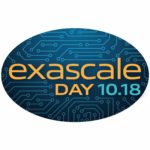Intel today officially announced its long awaited, next-generation server chips: the Xeon CPU Max, known to date as “Sapphire Rapids,” and the Data Center GPU Max, which for more than two years has been known – and been a focal point of scrutiny, speculation and frustration – as “Ponte Vecchio.” Both chips have been delayed, […]
It’s Official: Intel Announces Ponte Vecchio and Sapphire Rapids, Hints at ‘Falcon Shores’ XPU in 2024
AWS and Start-up TidalScale: Scaling Up in the Cloud
Amazon Web Services said in a blog post today that in partnership with start-up TidalScale it has taken on the problem of scaling up on the AWS cloud platform. The result of joint work between the two companies means AWS users “can now aggregate the CPUs, memory, network, interrupts, and storage of multiple AWS bare […]
Getting to Exascale Day 2022 with an Exascale System Wasn’t Easy
Finally, after 15-plus years of intellectual strain (planning), bureaucratic wrangling (budgeting), technical toil (system building) and, probably, some tears, the HPC community has arrived at an Exascale Day, October 18 (1018), on which we actually have a certified exaFLOPS supercomputer: Frontier, at Oak Ridge National Laboratory. Exascale is no longer in the future, it’s here, […]
@HPCpodcast: Intel Shipping Aurora Blades; Rocky Linux vs. CentOS; Tesla’s ‘Dojo’ AI Supercomputer
In this edition of the @HPCpodcast, Shahin and Doug kick things off on the news from Intel Innovation Day that the company is shipping Sapphire Rapids CPU / Ponte Vecchio GPU-powered blades to the Argonne Leadership Computing Facility for use in the lab’s Aurora exascale supercomputer, due for delivery by late 2022 or early 2023. It’s encouraging news, but still …
Frontier Testing and Tuning Problems Downplayed by Oak Ridge
Everything about the Frontier supercomputer, the world’s first exascale system residing at Oak Ridge National Laboratory, is outsized: its power, its scale and the attention it draws. In HPC circles, the attention and talk have increasingly focused on performance problems as the lab gets the system ready for “full user operations” by this coming January. […]
At ISC 2022: Microsoft Talks HPC-AI and AMD Chips in the Azure Cloud
We visited with Microsoft Azure during ISC – here is our conversation with two HPC-AI specialists, Alex Jean and Dr. Lukasz Miroslaw, for an update on Azure’s line-up of new capabilities and services in support of advanced AI and machine learning. The discussion highlights the cloud platform’s early adoption of the latest data center processors […]
Aurora on Schedule? Intel Says it’s Shipping Ponte Vecchio-Sapphire Rapids Blades to Argonne
The rumors had begun to cirulate – October is near, that starts the fourth quarter, 2023 isn’t far behind, all of which means Intel is coming up against a hard deadline to deliver its delayed Aurora exascale-class supercomputer to Argonne National Laboratory by the end of the year. Is another delay in the offing?
Then, yesterday, Intel tweeted this out: “Server blades with Intel 4th Gen Xeon and Ponte Vecchio, which uses Intel’s most advanced IP and packaging technology, are now shipping to Argonne National Labs to power the Aurora supercomputer!” And the tweet was backed by comments to the same effect from CEO Pat Gelsinger
Dell Technologies Interview: At the Univ. of Bristol’s Advanced Computing Research Centre ‘Typical Doesn’t Exist’
In this interview, part of our series done on behalf of Dell Technologies, we spoke with Simon Atack, HPC team leader of the Advanced Computing Research Centre at the UK’s University of Bristol, where he’s been for the past eight years. The centre supports about 2,000 users and has an extensive HPC infrastructure engaged in a range of scientific fields, including genomics, molecular dynamics and earth and environmental simulation. Much of this work runs on Dell Technologies supercomputing technology, which Atacks oversees.
OLCF’s Doug Kothe on Pushing Frontier Across the Exascale Line and the Future of Leadership Supercomputers
Everyone involved in the Frontier supercomputer project got a taste of what a moonshot is like. Granted, lives were not on the line with Frontier as they were when Armstrong and Aldrin went to the moon in 1969. But in other ways there are parallels between the space mission and standing up Frontier, the world’s […]











